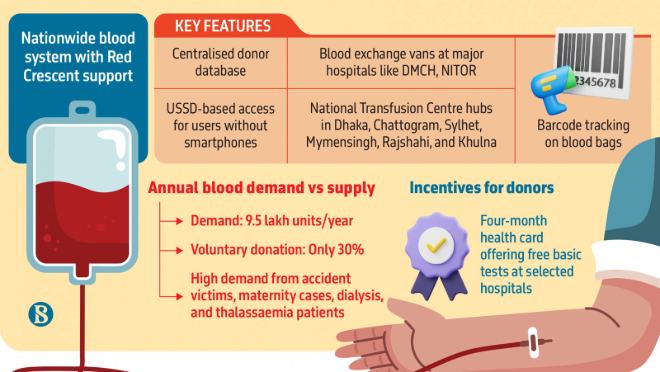Govt plans 'One Blood Network' to reduce hassle of finding donors
Govt plans 'One Blood Network' to reduce hassle of finding donors

In a major step towards improving access to blood for patients, the government has started working on an integrated blood supply system, the “One Blood Network.”
The initiative aims to ensure faster and safer blood, tackling the urgent and often chaotic search for blood from donors or blood banks during medical emergencies. It also aims to promote local production of blood products.
The network is being developed with support from the Bangladesh Red Crescent Society. It will feature a centralised donor database, mobile blood exchange vans, and National Transfusion Centre hubs in five divisional cities along with Dhaka.
According to officials related to the initiative, work on developing the database has already begun and streamlining of other components of the system are ongoing. They expect the network to be introduced soon.
Dr Ashraful Haque, assistant professor at the Transfusion Medicine Department of Cumilla Medical College Hospital, who is involved in the project, told The Business Standard, “A centralised donor database has been created as part of the initial phase, and information on around 3,00,000 donors has already been added.”
“This system is being designed in a way that people without smartphones can also use it. By dialling a USSD code using a regular mobile phone, anyone can search for available blood donors in their area. Once found, the donor can be contacted via SMS,” he added.He further said as part of the initiative, mobile blood vans will also be stationed at major hospitals including Dhaka Medical College Hospital and the National Institute of Traumatology and Orthopaedic Rehabilitation (NITOR). Patients’ relatives will be able to exchange blood there.”For example, someone needing A positive blood can swap their own O positive blood, if eligible,” he said.
Talking about the development of blood products, Ashraful said Dhaka will serve as the central hub, with additional transfusion centres set up in Chattogram, Sylhet, Mymensingh, Rajshahi, and Khulna.The collected blood will be used to produce medicinal products such as albumin, Factor VIII, and Factor IX from Fresh Frozen Plasma (FFP), a move expected to save the country thousand crores of taka by reducing reliance on imports.”We waste a large amount of blood every year,” said Dr Ashraful. “If we can produce albumin and Factor VIII locally from the blood that would otherwise be discarded, we can meet our own demand and also save money.”Experts say hospitals often store more blood than needed, and if unused within 25 days, the blood is discarded, leading to significant waste of both donors’ efforts and resources.
Traceable blood bags, quality control explaining how the integrated system will work, the officials involved said each blood bag will carry a barcode that includes the donor’s age, blood group, and expiration details. Using a smartphone, anyone will be able to scan and trace how and where the blood was used.
Officials believe this will reduce blood wastage and help prevent illegal trade in blood.
Bangladesh requires approximately 950,000 units of blood annually. However, only about 30% comes from voluntary donors. The remaining supply is usually arranged by the patient’s family or strangers.
The highest demand is for patients involved in accidents, and those suffering from eclampsia, pre-eclampsia, undergoing caesarean deliveries, dialysis, or dealing with thalassaemia.
To encourage voluntary donation, the network will offer a four-month health card to registered donors. The card will allow them and their families to receive certain blood tests free of charge at selected public and private hospitals.
Dr Sayedur Rahman, special assistant to the chief adviser, told The Business Standard, “Once the One Blood Network is active, people will find it much easier to get blood. It will also enable us to produce blood products domestically. This will be a major milestone for Bangladesh.”


